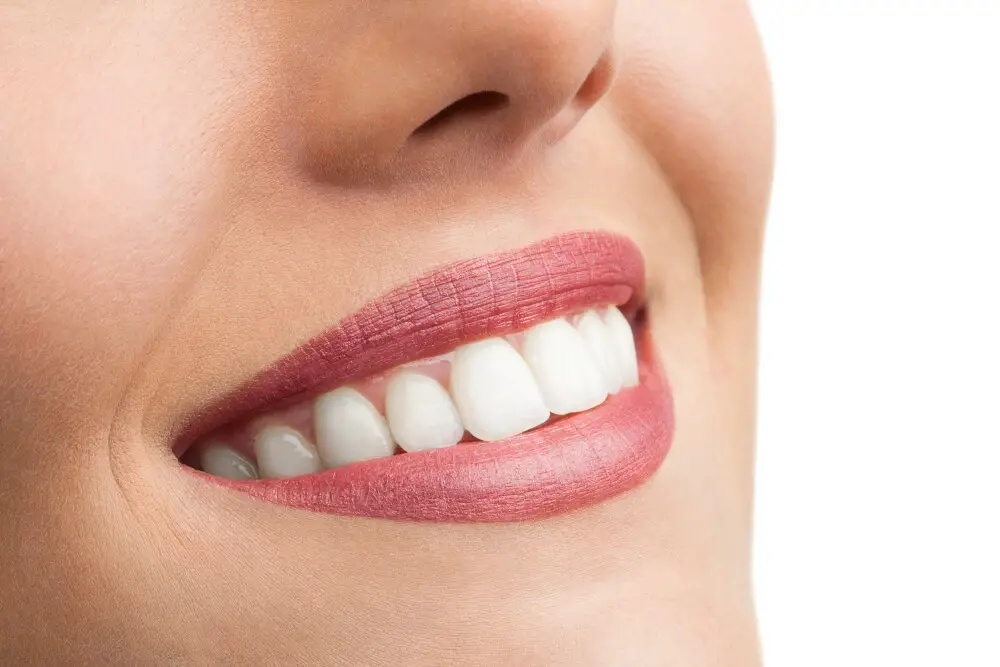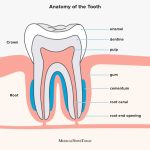Chalky Teeth: Understanding the Causes and Remedies

Chalky teeth, also known as hypomineralization, is a dental condition that affects people of all ages. It is a term used to describe the white or yellowish discoloration of teeth that occurs due to a lack of proper mineralization during tooth development. This condition can be a source of embarrassment for many people, as it affects the appearance of their teeth and can make them more susceptible to decay and sensitivity. Understanding the causes and remedies of chalky teeth is crucial for maintaining proper oral health and preventing further damage. There are several factors that can contribute to the development of chalky teeth, including genetics, poor nutrition, and certain medications. Children who are born prematurely or have a low birth weight are also at a higher risk of developing this condition. In addition, environmental factors such as exposure to fluoride or other toxins can also play a role in the development of chalky teeth. Fortunately, there are several remedies available to treat this condition, including dental bonding and veneers, as well as preventative measures such as regular dental check-ups and a healthy diet.
Chalky teeth, also known as enamel hypoplasia, is a dental condition that occurs when the tooth enamel is not fully developed or has not formed properly. This condition can result in white or yellowish spots, grooves, or pits on the teeth, making them appear chalky or dull. The enamel is an important protective layer of the teeth, and when it is weakened, it can lead to sensitivity, decay, and other dental problems. The causes of chalky teeth can vary, from genetics and certain medical conditions to poor nutrition and environmental factors. However, there are several remedies available, such as dental bonding, fluoride treatments, and dietary changes, which can help manage this condition and prevent further damage to the teeth.
Chalky teeth, also known as dental fluorosis, is a prevalent condition caused by excessive fluoride intake during the tooth development stage. The prevalence of this condition varies by geographic location and is more common in areas with high fluoride in drinking water. The appearance of chalky teeth ranges from barely noticeable white spots to severe brown discoloration, which can be aesthetically displeasing and affect an individual’s self-esteem. While the condition does not typically cause pain or discomfort, it can lead to increased tooth sensitivity and susceptibility to decay. Proper oral hygiene, regular dental check-ups, and treatment options such as microabrasion and bonding can help improve the appearance and health of chalky teeth.
Causes of Chalky Teeth

Chalky teeth are a common dental condition that is characterized by the presence of white spots or patches on the teeth. There are several causes of chalky teeth, with the most common being a condition known as dental fluorosis. This condition occurs when a person is exposed to high levels of fluoride during the development of their teeth, typically between the ages of 0-8 years old. The excess fluoride can cause white spots or streaks to form on the teeth, which can be unsightly and may affect the strength of the teeth. Another common cause of chalky teeth is poor dental hygiene. When a person does not brush or floss their teeth regularly, plaque can build up on the teeth, leading to a condition known as hypomineralization. This condition can cause white spots to form on the teeth, which can eventually lead to cavities and tooth decay. Additionally, certain medical conditions such as celiac disease or chronic kidney disease can also cause chalky teeth. It is important to identify the underlying cause of chalky teeth to determine the most appropriate treatment plan.
Genetics play a significant role in the development of chalky teeth. Studies have shown that certain genetic variations can increase the risk of enamel defects, resulting in chalky teeth. Specifically, mutations in the genes responsible for enamel formation and mineralization can lead to enamel hypomineralization, which is characterized by weak, porous, and discolored enamel. While genetic factors cannot be changed, early detection and prompt intervention can help prevent further damage to the affected teeth. Treatment options vary depending on the severity of the condition and may include topical fluoride, dental bonding, and in severe cases, tooth extraction. It is essential to consult with a dental professional to determine the best course of action for each individual case.
Environmental factors can play a significant role in the development of chalky teeth. One such factor is the excessive consumption of acidic foods and drinks, which can erode the enamel and weaken the teeth. Additionally, exposure to environmental toxins, such as lead and fluoride, can also contribute to the formation of chalky teeth. Poor oral hygiene, including inadequate brushing and flossing, can also lead to the development of these teeth. It is essential to take necessary precautions to avoid the risk of chalky teeth by maintaining a healthy diet, avoiding harmful substances, and practicing good oral hygiene habits. Identifying and addressing these environmental factors can help prevent further damage and promote healthy teeth.
Fluorosis is a dental condition that occurs due to excessive fluoride intake during the tooth development stage. It can result in white streaks, spots or patches on the teeth, making them appear chalky or opaque. Although fluoride is essential for healthy teeth, too much of it can cause the enamel to become porous, weak, and prone to decay. The severity of fluorosis depends on the amount and duration of fluoride exposure, as well as the individual’s age and overall health. In mild cases, fluorosis may not require treatment, while severe cases may require cosmetic or restorative procedures such as veneers, bonding, or crowns. It is essential to maintain a balanced fluoride intake and follow proper dental hygiene practices to prevent fluorosis and other dental problems.
Nutritional deficiencies refer to a condition where the body lacks essential nutrients required for proper functioning. These deficiencies can have a significant impact on oral health and can lead to chalky teeth. Calcium and vitamin D are essential for the formation and maintenance of strong teeth. A deficiency in either of these nutrients can cause enamel hypoplasia, a condition characterized by the formation of weak and chalky teeth. Additionally, a lack of vitamin C can cause scurvy, a condition that weakens the gums and leads to bleeding, making it harder to maintain good oral hygiene. A balanced diet that includes a variety of fruits, vegetables, and dairy products can help prevent nutritional deficiencies and promote good oral health.
Symptoms of Chalky Teeth

Chalky teeth, also known as dental fluorosis, is a condition that affects the appearance and strength of teeth. The most common symptom of chalky teeth is the presence of white or brown spots on the tooth enamel. These spots may be subtle or noticeable, depending on the severity of the condition. In severe cases, the enamel may appear pitted or rough to the touch. Chalky teeth can also cause sensitivity to hot and cold temperatures, as well as pain or discomfort when biting or chewing food. Other symptoms of chalky teeth may include yellowing or discoloration of the teeth, weakened tooth enamel, and an increased risk of cavities. In some cases, the condition may cause the teeth to develop small cracks or fractures, which can make them more susceptible to decay. Additionally, chalky teeth may affect a person’s self-esteem, as the appearance of the teeth can be unsightly and may cause embarrassment or discomfort. If you suspect that you have chalky teeth, it is important to consult a dentist for an accurate diagnosis and appropriate treatment.
Discoloration is a common dental problem that can occur due to a variety of reasons. It can be caused by poor oral hygiene, smoking, consuming foods and beverages that stain teeth, or certain medications. Discoloration can manifest in different ways, such as yellowing, brown spots, or grayish tinges, and it can affect both the enamel and dentin layers of the teeth. In cases of chalky teeth, discoloration can be a sign of dental fluorosis, a condition that results from excessive exposure to fluoride during tooth development. To address discoloration, there are several remedies available, including professional teeth whitening, dental bonding, veneers, or simply improving oral hygiene practices. A dental professional can provide guidance on the most suitable approach based on the individual’s needs and circumstances.
Sensitivity is a common dental issue that affects many people of all ages. It is characterized by a sharp and sudden pain in the teeth when exposed to hot or cold foods and beverages, sweet or sour foods, and even cold air. The causes of tooth sensitivity can be numerous, including gum recession, enamel erosion, tooth decay, and teeth grinding. To alleviate sensitivity, there are several home remedies and professional treatments available, such as using desensitizing toothpaste, avoiding acidic foods and drinks, wearing a mouthguard, and undergoing dental procedures like fillings, root canal therapy, or bonding. However, it is important to consult a dentist to determine the underlying cause and the best course of treatment for your specific case of sensitivity.
Cavities, also known as dental caries, are a common dental problem that can affect anyone. However, some individuals may be at an increased risk of developing cavities due to certain factors. People who consume a diet high in sugar and carbohydrates are more likely to develop cavities as these substances provide a favorable environment for bacteria to thrive. Poor oral hygiene practices, such as infrequent brushing and flossing, can also increase the risk of cavities. Additionally, individuals who have dry mouth, acid reflux, or a weakened immune system may also be more susceptible to cavities. It is important to identify these risk factors and take necessary steps to prevent cavities, such as maintaining good oral hygiene and reducing sugar intake.
Treatment and Remedies for Chalky Teeth

Chalky teeth are a common dental condition that can lead to sensitivity, discoloration, and decay. However, there are several treatment options and remedies that can help alleviate the symptoms and improve the overall health of your teeth. One of the most effective treatments for chalky teeth is enamel microabrasion, which involves removing a thin layer of enamel using a specially designed handpiece. This procedure can help remove the white spots and rough patches that are characteristic of chalky teeth, while also smoothing out the surface of the tooth and restoring its natural shine. Another option is dental bonding, which involves applying a tooth-colored resin to the affected area and then shaping it to match the surrounding teeth. This can help improve the appearance of the tooth and also provide additional protection against decay and sensitivity. In addition to these professional treatments, there are also several home remedies that can help alleviate the symptoms of chalky teeth. One of the simplest and most effective remedies is to switch to a toothpaste that is specifically designed for sensitive teeth. These toothpastes contain ingredients like fluoride and potassium nitrate, which can help strengthen the enamel and reduce sensitivity. Another option is to use a remineralizing toothpaste or mouthwash, which can help restore the minerals that have been lost from the enamel. Additionally, it is important to maintain good oral hygiene habits, such as brushing twice a day and flossing regularly, in order to prevent further damage to the teeth and maintain overall dental health.
Fluoride treatment is a common solution to combat the effects of chalky teeth. This treatment involves applying fluoride directly to the teeth in order to strengthen the enamel and protect against further damage. Fluoride is a mineral that is naturally found in water and soil, and it has been shown to be highly effective in preventing cavities and promoting overall dental health. Fluoride treatment can be administered in a variety of ways, including through gels, foams, varnishes, or rinses. It is often recommended for those who are at higher risk of developing tooth decay, such as children and individuals with dry mouth or gum disease. Regular fluoride treatment can help alleviate the symptoms of chalky teeth and prevent future dental issues.
Dental sealants are a preventive measure used to protect teeth from decay. The sealants are made of plastic material that is applied to the chewing surfaces of the back teeth. This is an effective way to block out the bacteria and food particles that can get trapped in the deep grooves of the teeth. Dental sealants are commonly used in children to protect their developing teeth. However, adults can also benefit from dental sealants, especially those who are at a high risk of developing cavities. The application of dental sealants is a painless and quick process that can provide protection for several years. It is important to maintain good oral hygiene practices even with the presence of dental sealants.
Composite bonding is a dental procedure that can help to improve the appearance of teeth that are discolored, chipped, or have gaps. This technique involves the application of a tooth-colored composite resin material to the affected tooth, which is then shaped and polished to blend seamlessly with the surrounding teeth. Composite bonding is a minimally invasive and cost-effective alternative to more extensive treatments such as veneers or crowns. It can also be used to repair small cavities or to protect exposed tooth roots. While composite bonding is a relatively simple procedure, it requires skill and artistry on the part of the dentist to achieve natural-looking results. With proper care and maintenance, composite bonding can provide patients with a long-lasting and aesthetically pleasing solution to their dental concerns.
Whitening treatments are often sought after by those with chalky teeth to improve the appearance of their smile. These treatments can range from over-the-counter whitening strips to professional dental procedures such as bleaching or microabrasion. While these treatments can be effective in removing surface stains and improving the overall brightness of teeth, it’s important to address the underlying cause of chalky teeth to ensure long-term success. Factors such as enamel hypoplasia, fluorosis, or genetics can contribute to chalky teeth, and a dental professional can provide guidance on the best course of action to address these issues.
Prevention of Chalky Teeth

Chalky teeth refer to a condition where the teeth appear white, dull, and chalky in color. This condition is caused by the mineralization of the tooth enamel, which alters the translucency of the enamel. Chalky teeth can be prevented by adopting good oral hygiene practices, such as brushing twice a day, flossing, and visiting the dentist regularly. It is important to use a fluoride toothpaste when brushing, as fluoride helps to strengthen the tooth enamel and prevent demineralization. Additionally, consuming a healthy diet rich in calcium and vitamin D can help to promote healthy tooth enamel. Avoiding acidic foods and drinks is also an important step in preventing chalky teeth. Acidic foods and drinks can erode the tooth enamel, making the teeth more susceptible to demineralization. It is important to avoid consuming these types of foods and drinks frequently, and to rinse the mouth out with water after consuming them. Drinking water throughout the day can also help to prevent chalky teeth, as it helps to flush out harmful bacteria and acids from the mouth. By adopting these preventative measures, individuals can maintain healthy tooth enamel and prevent the development of chalky teeth.
Proper nutrition is essential to maintaining healthy teeth and preventing the development of chalky teeth. Calcium and vitamin D are crucial nutrients that promote strong teeth and bones. Eating a balanced diet that includes dairy products, leafy greens, and fortified cereals can help ensure you’re getting enough of these nutrients. Additionally, limiting sugary and acidic foods and drinks can help prevent erosion of tooth enamel, which can lead to the development of chalky teeth. Proper nutrition is just one aspect of maintaining good oral health, but it can have a significant impact on the health of your teeth and overall well-being.
Having good oral hygiene is crucial for maintaining healthy teeth and gums. It involves brushing twice daily with fluoride toothpaste, flossing at least once a day, and using mouthwash to kill bacteria and freshen breath. Proper oral hygiene also includes visiting your dentist regularly for check-ups and cleanings. Neglecting your oral hygiene can lead to a buildup of plaque, which can cause gum disease and tooth decay. Additionally, certain habits such as smoking and consuming sugary or acidic foods and drinks can also contribute to the development of dental problems. By prioritizing good oral hygiene practices, you can prevent many dental issues and maintain a healthy smile.
Regular dental checkups are essential for maintaining optimal oral health. These checkups are an opportunity for your dentist to examine your teeth, gums, and mouth for any signs of decay, disease, or other issues. During a checkup, your dentist will also clean your teeth and remove any plaque or tartar buildup. This is important because even with proper oral hygiene practices, plaque can still accumulate in hard-to-reach areas of the mouth. By attending regular dental checkups, you can catch any potential dental issues early on, before they become more serious and require more extensive treatment. Additionally, your dentist can provide you with valuable information and tips on how to maintain good oral hygiene habits and keep your teeth healthy and strong.
Chalky teeth are characterized by white spots or patches on the surface of teeth. The causes of this condition can vary, but it is often linked to excessive fluoride exposure during early childhood. Other possible causes may include genetics, poor nutrition, and certain medications. Symptoms of chalky teeth may include sensitivity to hot or cold temperatures, as well as an increased risk of tooth decay and discoloration. In severe cases, chalky teeth can lead to tooth loss if left untreated. It is important to consult a dental professional for proper diagnosis and treatment options, which may include fluoride treatments, dental sealants, or cosmetic procedures.
The importance of treatment and prevention cannot be overstated when it comes to chalky teeth. Chalky teeth are a common dental condition that can lead to significant pain and discomfort, as well as a range of other dental issues if left untreated. Effective treatment options for chalky teeth include dental sealants, fluoride treatments, and in some cases, dental restorations. Prevention is also critical when it comes to chalky teeth. Practicing good oral hygiene, eating a healthy diet, and avoiding sugary and acidic foods and drinks can all help to prevent chalky teeth from developing in the first place. By taking steps to both treat and prevent chalky teeth, individuals can help to maintain healthy teeth and gums and avoid the complications associated with this common dental condition.
Conclusion

In conclusion, chalky teeth can be a painful and uncomfortable condition that affects many people. The causes of this condition can vary, ranging from poor dental hygiene to genetics. However, with proper care and treatment, it is possible to manage and even prevent the onset of chalky teeth. Some simple remedies, such as regular brushing and flossing, can go a long way in maintaining healthy teeth. Additionally, consulting with a dentist or dental professional can provide further guidance and treatment options. Ultimately, taking care of our teeth is a crucial part of overall health and well-being, and it is important to prioritize our dental hygiene to avoid the discomfort and pain associated with chalky teeth.







